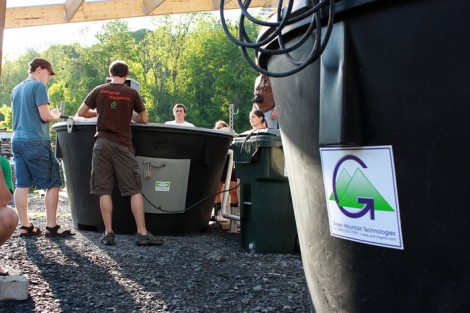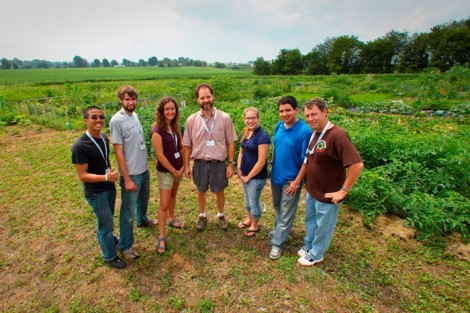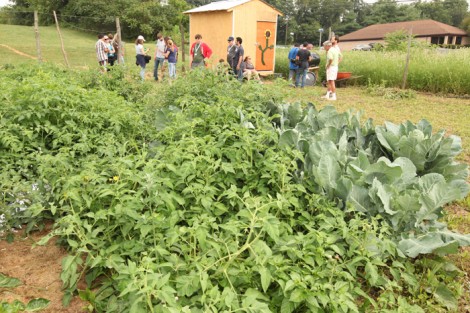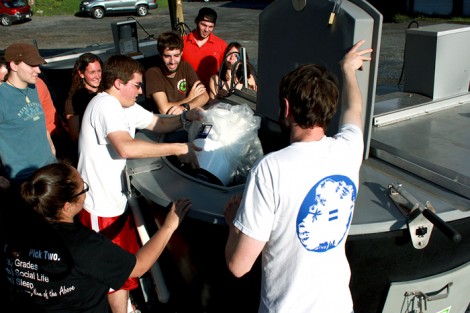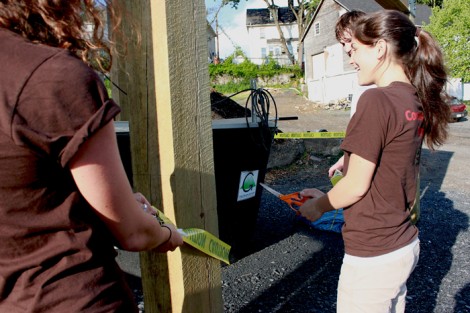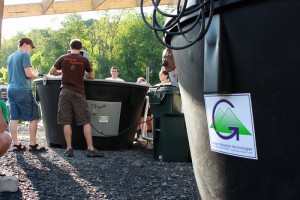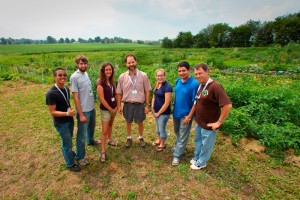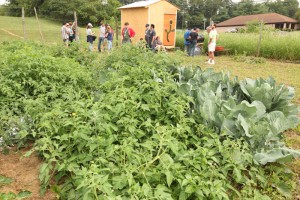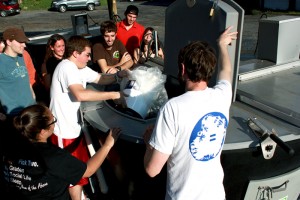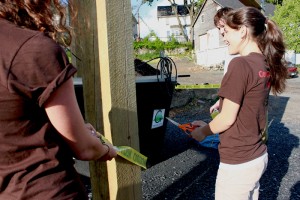Jennifer Bell ’11 (Purcellville, Va.) is crouched near a row of bell peppers at Lafayette’s student-run garden in Metzgar Fields, pulling thin weeds from the soft dirt.
A few rows back her mother, wearing a straw hat to deflect the midday sun, waters a plot of potatoes. “She came to visit me and I put her to work,” says Bell, a member of Lafayette Environmental Awareness and Protection (LEAP). Bell was instrumental in securing a $41,000 state grant last year to purchase commercial size tubs to compost all the half-eaten hamburgers, pizza, fries, and other scraps students throw away after a meal.
The Earth Tubs were recently installed down the hill from Kirby Sports Center on Bushkill Street, and have the capacity to reduce the College’s food waste by 1,000 pounds a day and provide enough compost to fertilize the College’s flower beds and 2-acre community garden. The project is also being supported by a $68,000 grant from the Ludwick Family Foundation.
“The garden project wouldn’t have started without the composting program,” says Bell, a geology major who is working with Art Kney, associate professor of civil and environmental engineering, on a research project this summer involving nitrogen content in compost. “We realized we were going to have all this compost and nowhere to use it. We talked about how great it would be to start a garden and produce organic food.”
The goal is to supply dining services with the tomatoes, beans, eggplant, lettuce, watermelons, and other produce grown in the garden, and it looks like that may happen on a limited scale by fall.
“A lot of things have sprouted but nothing has been picked,” Bell says, gesturing across the green and brown expanse. “We’re hoping for a later harvest when school gets back in.”
In the meantime, the compost tubs are up on running.
“We’ve been testing them to see if they’re working properly,” says Kney, who initiated the project as adviser to the Society of Environmental Engineers and Scientists (SEES). “Starting June 23 we’ll be filling them continuously.”
During the academic year, the college produces about 1,300 pounds of food waste a day, says Bell. In the past it was trucked to a garbage dump. Now the food waste, as well as recyclable napkins and biodegradable paper products, will be collected from the dining halls, run through a water extractor and then combined with woods chips and mulch hay in the composting units.
“Over time we should see a significant reduction of waste in landfills,” says Joseph Binotto, director of dining services.
The goal, says SEES president Emily Clark, ’12 (Kendall Park, N.J.), is to compost all the waste on campus, but for now the groups are targeting the cafeterias in Farinon College Center and Marquis Hall.
“This project has really opened my eyes about where everything goes and comes from,” says Clark, a civil engineering major. “You go to the grocery store and you have no idea.”
LEAP and SEES recently received a $10,000 federal competitive grant to expand the community garden. The award makes Lafayette eligible for a $75,000 grant through the Environmental Protection Agency’s People, Prosperity and Planet Student Design Competition for Sustainability. The College’s Engineers Without Borders team won it in 2006 for implementing water filtration and distribution systems in El Convento, Lagunitas, and La Fortuna–rural Honduran villages without any modern amenities.
